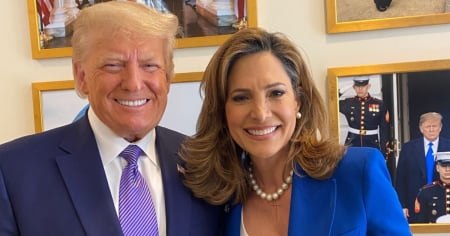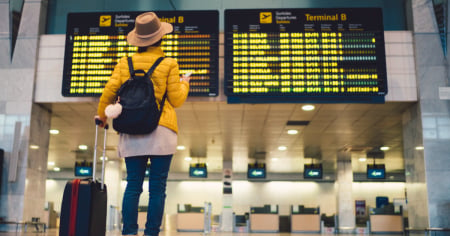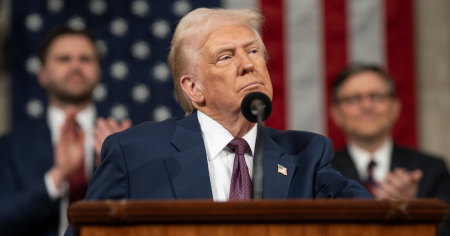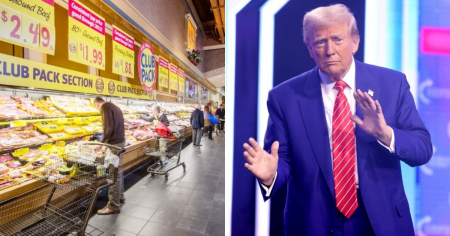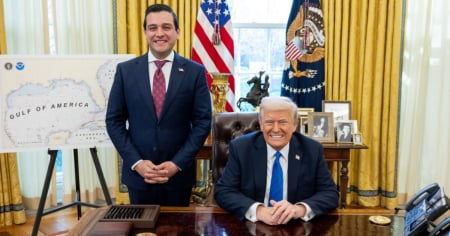The President of the United States, Donald Trump, stated this Thursday that his country is regaining strategic control of the Panama Canal, an area that, according to him, had fallen under concerning Chinese influence during previous administrations.
"We have deployed many soldiers to Panama", Trump stated, declaring that “we have reclaimed some areas that we previously had and no longer did. But now we have them”.
The statements were made during the cabinet meeting in which Secretary of Defense, Pete Hegseth, provided details about a recent visit to Panama alongside the United States Southern Command.
"We were at the Panama Canal with its Southern Command. Command ships, troops, F-18s... And they signed some historic agreements, including one with the Panama Canal Authority. A framework for the U.S. to pass through the canal first and free of charge," Hegseth explained. He also noted that a memorandum of understanding was signed with the Panamanian Minister of Security to allow a U.S. military presence in the area.
One of the points mentioned was the reactivation of the military space at Fort Sherman, the former U.S. base on the isthmus, which is now being repurposed along with a naval and air station, according to Hegseth. “The idea is to secure the Panama Canal from Chinese influence,” the official emphasized.
Hegseth took the opportunity during the conversation to blame previous administrations, such as that of Barack Obama, for having "allowed" the infiltration of Chinese interests in the area.
“Now we have the opportunity to expel them completely,” he stated, pointing out that the current Panamanian president, José Raúl Mulino, has shown a favorable stance toward military cooperation with the United States and a rejection of Beijing's influence. “They want the Chinese communists out,” he maintained.

Before returning to the White House and already being the elected president of the United States, Trump fervently reaffirmed his intention to regain control of the Panama Canal, a matter that has generated controversy since the presidential campaign.
In that instance, Trump accused the Panamanian government of imposing excessive fees on American ships using this crucial navigation route between the Atlantic and the Pacific, and stated that China has taken on a dominant role in his administration.
On his part, now in the Oval Office, the Republican reiterated his intention to reclaim the Canal, warning that if he does not, “something very big is going to happen.”
His statements coincided with the official visit to Panama by Secretary of State Marco Rubio in February.
After that visit, the Panamanian government, led by José Raúl Mulino, announced that it would not renew its participation in the Belt and Road Initiative, the global infrastructure megaproject promoted by China since 2013. Panama had been the first Latin American country to join the plan in 2017, aiming to attract investments in ports, transportation, and energy.
"It's a great step forward for a free Panama Canal", Rubio stated on social media, attributing the Panamanian decision to the "leadership" of President Trump.
Moreover, Rubio warned that the involvement of Chinese companies in port projects could violate the neutrality treaty of the canal, which would provoke a response from Washington.
As a gesture of alignment with the U.S., President Mulino committed to reviewing the concessions granted to Chinese companies and revealed that audits are being conducted on their operations.
In recent days, the trade tensions between the United States and China have significantly escalated due to a series of tariff increases and threats of retaliation that have raised global concerns.
Trump has raised tariffs on Chinese products to a total of 145%, according to the agency Efe. This increase includes a recent rise from 84% to 125%, plus an additional 20% tariff related to fentanyl trafficking. The White House clarified that the initial figure of 125% announced did not account for this last tariff, which led to public confusion until it was corrected.
Moreover, Trump suspended a universal 10% tariff on all U.S. trading partners, except for China, which deepens the economic rift between the two powers.
In retaliation, China imposed an 84% tariff on American products and stated that it will not yield to pressure. The Chinese government condemned these measures, calling them "economic harassment" and warning that threats are not the proper way to resolve trade disputes.
Frequently Asked Questions about the United States' Involvement in the Panama Canal
Why does Donald Trump claim he is expelling China from the Panama Canal?
Donald Trump claims he is expelling China from the Panama Canal due to his concerns about Chinese influence in the region. According to Trump, China has taken on a dominant role in the management of the canal, and his government is mobilizing troops and signing agreements to regain strategic control of the area.
How has Panama reacted to the United States' statements about the Canal?
The President of Panama, José Raúl Mulino, has firmly responded to the statements from the United States, asserting that the sovereignty of the Panama Canal is not in question. Mulino emphasized that the Panamanian administration ensures the efficient operation of the canal and that the current fees are necessary for its maintenance.
What agreements has the United States signed with Panama to strengthen its presence in the Canal?
The United States has signed historic agreements with the Panama Canal Authority, including a framework that allows for the priority and free passage of U.S. vessels through the canal. Additionally, a memorandum of understanding has been signed to allow for a U.S. military presence in the area.
What is China's influence on the Panama Canal according to the Trump administration?
The Trump administration asserts that China has increased its control over the Panama Canal through investments and participation in port projects. This situation is viewed as a violation of the canal's neutrality treaty and has prompted the Trump administration to take measures to counteract Chinese influence.
What measures has Panama taken in response to pressure from the United States?
Panama has decided not to renew its participation in China's Belt and Road Initiative, an infrastructure and trade project promoted by Beijing. This decision was made following warnings from the United States about the risks of economic dependence and the potential political influence of China in the region.
Filed under:

